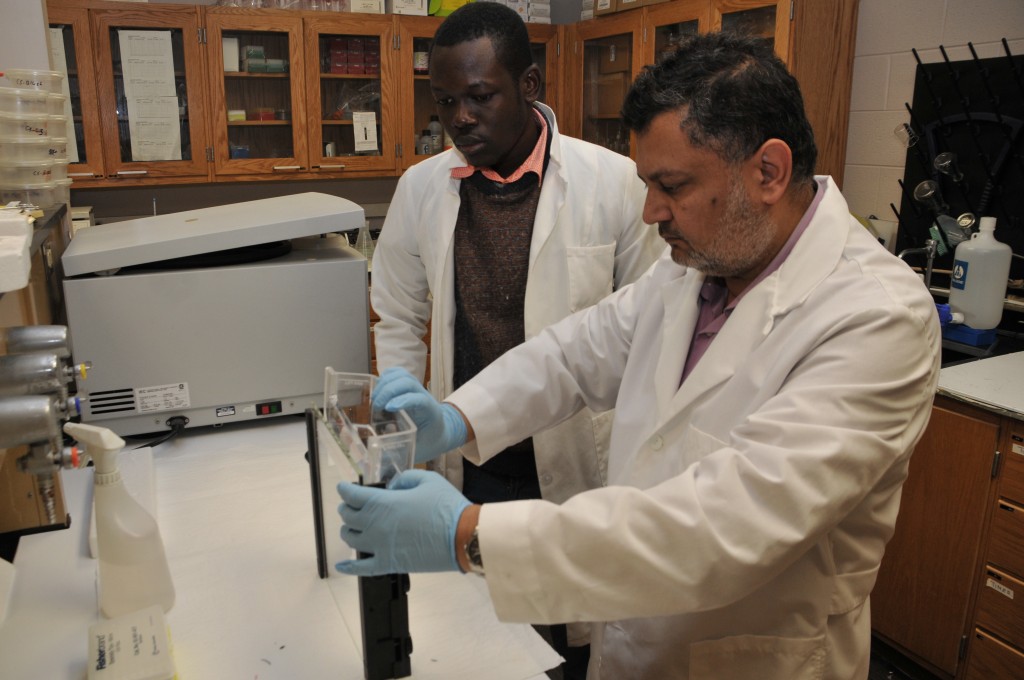 NASHVILLE, Tenn. (TSU News Service) – The U.S. Department of Agriculture has divided its annual funding awards for capacity building in teaching, research and extension. With nearly $1.4 million, Tennessee State University is among the highest recipients of this year’s $18 million allotted for the 20 Land-Grant Colleges and Universities that submitted successful proposals.
NASHVILLE, Tenn. (TSU News Service) – The U.S. Department of Agriculture has divided its annual funding awards for capacity building in teaching, research and extension. With nearly $1.4 million, Tennessee State University is among the highest recipients of this year’s $18 million allotted for the 20 Land-Grant Colleges and Universities that submitted successful proposals.
The capacity building fund, attained through a competitive grant writing process, is an initiative intended to increase and strengthen food and agriculture sciences at the schools through integration of teaching, research and extension.
Four professors in the College of Agriculture, Human and Natural Sciences will share this year’s awards in research and extension services, according to Dr. Carter Catlin, associate dean for Research. They are John Hall, Agnes Kilonzo-Ntheng, William Sutton and Samuel Nahashon.
“These grants help us build our capacity in new frontiers of research and education,” Dr. Chandra Reddy, the dean of CAHNS said. “We have immensely benefited from this program by adding teaching and research capacity in many new areas such as biofuels, remote sensing, urban forestry, biotechnology, to name a few. Our faculty have been doing a superb job of competing and securing these funds at the highest rate possible.”

Hall, assistant professor in Extension Services, received $455,923 to design a state-of-the-art mobile education trailer to increase agricultural literacy in urban communities across the southeastern United States. Additionally, the funding will support the creation and implementation of a comprehensive plan to recruit students for all degree programs in CAHNS as well as develop leadership training program for youth, collegiate, and adult audiences.
“This is an integrated project that seeks to meet teaching and extension needs,” Hall said.

In research, Kilonzo-Ntheng will use her $350,000 award in a collaborative effort with the University of Maryland Eastern Shore to implement Good Agricultural Practices certification programs for small and medium-sized produce farms, and determine risk practices and profiles for generic E. coli, Salmonella and Enterobacteriaceae in produce farms. She will also conduct risk communication workshops for small and medium-sized scale growers, and increase students’ participation in food safety outreach.
“Produce growers have come under increasing pressure to ensure that their products are safe, wholesome, and meet the proposed rules under the Food Safety Modernization Act, said Kilonzo-Ntheng, associate professor of Family and Consumer Sciences. “While the goal for GAPs certification is clear, limited-resource growers often do not pursue the certification due to the costs. However, to succeed in the 21st century economy, these growers must be GAPs certified and empowered to meet food safety requirements.”

For Sutton, assistant professor of Agricultural and Environmental Sciences, his $400,000 research award will study how landscape alteration in the form of forest management impacts wildlife conservation.

Nahashon, professor and chair of the Department of Agricultural and Environmental Sciences, received $100,000 to research new and emerging areas of biotechnology such as transcriptome analysis and computational bioinformatics. He will collaborate with an expert in computational bioinformatics at the University of Georgia to determine the mechanisms and modes of action of probiotics in conferring beneficial effects to poultry.
“This project is also an effort to continue strengthening the biotechnology research and teaching program in the Department of Agricultural and Environmental Sciences at TSU,” Nahashon said.
Department of Media Relations
Tennessee State University
3500 John Merritt Boulevard
Nashville, Tennessee 37209
615.963.5331
About Tennessee State University
With more than 9,000 students, Tennessee State University is Nashville’s only public university, and is a comprehensive, urban, co-educational, land-grant university offering 38 undergraduate, 22 graduate and seven doctoral programs. TSU has earned a top 20 ranking for Historically Black Colleges and Universities according to U.S. News and World Report, and rated as one of the top universities in the country by Washington Monthly for social mobility, research and community service. Founded in 1912, Tennessee State University celebrated 100 years in Nashville during 2012. Visit the University online at tnstate.edu.


